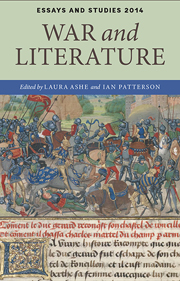Book contents
- Frontmatter
- Contents
- List of Illustrations
- Notes on Contributors
- Preface
- I IDEOLOGIES
- II INTERPRETATIONS
- Crossing the Rubicon: History, Authority and Civil War in Twelfth-Century England
- ‘The Reader myghte lamente’: The sieges of Calais (1346) and Rouen (1418) in chronicle, poem and play
- Shakespeare's Casus Belly; or, Cormorant War, and the Wasting of Men on Shakespeare's Stage; or, Eating Wars and Digesting Plays; or, The Art of Chucking Men Into Pits; or, Shakespeare, Tacitism, and Why Plato Don't Matter
- Unnavigable Kinship in a Time of Conflict: Loyalist Calligraphies, Sovereign Power and the ‘Muckle Honor’ of Elizabeth Murray Inman
- Proclaiming the War News: Richard Caton Woodville and Herman Melville
- III AFTERMATHS
- Index
Unnavigable Kinship in a Time of Conflict: Loyalist Calligraphies, Sovereign Power and the ‘Muckle Honor’ of Elizabeth Murray Inman
from II - INTERPRETATIONS
Published online by Cambridge University Press: 05 October 2014
- Frontmatter
- Contents
- List of Illustrations
- Notes on Contributors
- Preface
- I IDEOLOGIES
- II INTERPRETATIONS
- Crossing the Rubicon: History, Authority and Civil War in Twelfth-Century England
- ‘The Reader myghte lamente’: The sieges of Calais (1346) and Rouen (1418) in chronicle, poem and play
- Shakespeare's Casus Belly; or, Cormorant War, and the Wasting of Men on Shakespeare's Stage; or, Eating Wars and Digesting Plays; or, The Art of Chucking Men Into Pits; or, Shakespeare, Tacitism, and Why Plato Don't Matter
- Unnavigable Kinship in a Time of Conflict: Loyalist Calligraphies, Sovereign Power and the ‘Muckle Honor’ of Elizabeth Murray Inman
- Proclaiming the War News: Richard Caton Woodville and Herman Melville
- III AFTERMATHS
- Index
Summary
[A] dark wall of rule supports the structure of every letter, record, transcript: every proof of authority and power. I know records are compiled by winners, and scholarship is in collusion with Civil Government. I know this and go searching for some trace of love's infolding through all the paper in all the libraries I come to.
The Contest is not between Ministers and the Colonies, but between Parliament and the Colonies; and whichever of them conquers will be Sovereign Power.
Exploring the records of loyalist refugees during the American revolutionary war, I have wanted to understand their diverse forms of attachment to sovereign power, its insistence in lives often torn apart by conflict. It was a revolution experienced by many as a civil war, in which colonial Americans and their British kin discovered themselves internally divided, a felt set of betrayals and desires separating one from another, ‘Bone of our Bone’ in John Adams’ words. This was a war, as Dror Wahrman puts it, ‘irreducible to any reliable map of “us” and “them” based on a stable criterion of difference’, and it rebounded in America on every aspect of daily living, bonds and everyday certainties suddenly opened to urgent question. What did it mean to be ‘loyal’, and to whom, at the very point when the terms of sovereignty were being transformed and divided into winners and losers? In what sense was loyalism irreducible to the ‘command expressions’ that would come to name it as history?
- Type
- Chapter
- Information
- War and Literature , pp. 139 - 162Publisher: Boydell & BrewerPrint publication year: 2014



